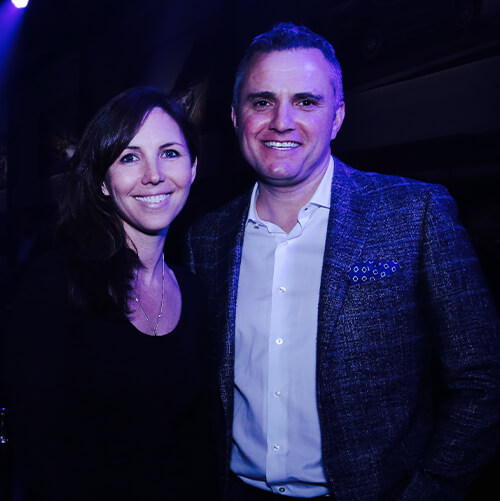
One question to diagnose your brand’s health
One of the most important business and marketing books I’ve ever read is Marty Neumeier’s The Brand Gap. Most of my team can recall a video call where I disappear off camera to retrieve a book filled with sticky notes and scribbles, and quickly flip through it to find some brand-related idea I’m referencing. I’d wager 50% of the time I’m grabbing The Brand Gap.
Among the many applicable branding ideas Neumeier shares, one of my favourites comes in the form of a question—technically the last in a set of three questions. It’s a set of questions that will bring most director, leadership, or c-suite company meetings to halt:
- Who are you?
- What do you do?
- Why does it matter?

From my own experience I can attest that “most companies have occasional trouble answering the first question, a little trouble answering the second, and a lot of trouble answering the third.”[1]
While it’s the toughest, the last question is the most important to answer if you want to build a strong, healthy, and successful brand. We can have some fun with variations if it helps.
Try this on for size: why does what your company does matter?
Do you have an answer? A real answer?
- “It matters because we make the best (product) or offer the best (service).” Yeah, no—everybody says that.
- “It matters because our quality is the best in the world.” Again, a claim everyone makes.
- “It matters because we’re the only ones who do (insert answer here).” So what? Either what you do doesn’t really matter or you are one new competitor away from falling into oblivion.
- “It matters because we’re cutting-edge, best-in-class, ahead-of-the-curve!” Really? If you’re best-in-class in the most insignificant thing in the world then does it truly matter?
As long as you promise to avoid these cliches, I’m happy to ask again: do you have a real answer?
A real answer must be short, clear, and unambiguous. If your answer includes a 15-minute monologue, then it doesn’t count. Same goes for written answers that are long enough to be submitted for a PHD dissertation, or better yet, ones that are so complex they require a PHD just to make sense of them.
I’ll take it one step further. If the most senior leaders in your organization can arrive at some sort of consensus and deliver a semi-coherent answer that is partially unique and uses minimal buzzwords—then alright, that’s a start.
But if I walk out of your boardroom and ask three of your employees “why does what your company does matter?” and hear answers that are as close to yours as the east is to the west—then you have a problem.
Might be a tough pill to swallow, but your brand is not what you say it is, it’s what they say it is.[2]

I don’t want to suggest that your answer to this question is a cure-all solution that will fix all your brand woes. Yet there are two critical ways in which I think this question and its answer could help your company establish a strong foundation for your brand that will position you for growth and success.
First, asking “Why does what you do matter?” forces leaders and decision makers to talk about something that is usually not given much airtime. It creates space that isn’t typically available when you’re busy with day-to-day operations. The opportunity to talk through an answer brings a whole lot of unspoken assumptions to the surface. This is a very, very good thing.
The question also forces leaders to put words to ideas and thoughts that were always sort of nebulous. Even better, it forces them to write down something that might have only ever existed in their thoughts.
If the process of clarifying and understanding your brand strategy is a giant iceberg, the why does it matter question is simply the very top. It’s the first question in a long domino effect that leads to another clarifying question, then another, then one more, and so on.
This is the gift of the question. The process of getting to the answer is just as important as the answer itself.
Second, a well-thought answer can bring clarity and understanding to other components of your brand strategy. Like a compass or the Rosetta stone, this answer will help you interpret and uncover more of who you are and what matters most.

If you can answer why what you do matters, then you should be able to arrive at some sort of conviction your brand holds that gives a reason for your answer. From there you can also derive your purpose, mission, and the values you must hold to inform your behaviour.
So—how’s that answer coming along? Why does what your company does matter?
If you’ve got an unambiguous answer that is close to what three randomly selected staff from your organization would say, then congratulations—you have a strong and healthy brand strategy. Champagne and oysters for all! You can stop reading here.
Now for the rest of us.
The vast majority of companies (including ours at one point) will struggle to find a clear answer. It’s hard work, it takes a lot of time, and it can feel extremely overwhelming.
Why does this matter? If your leadership and staff can’t clearly and consistently articulate why what you do matters, then your brand can’t possibly be in a super-healthy place. Right?
Even a great logo, a website re-design, or new product line can’t cover up for a brand that lacks a compelling why.

Time is your most precious commodity. Most companies don’t have months or years to figure out a brand strategy clarification and alignment process, and then somehow organize the findings into coherent deliverables for everyone in the organization.
That’s why we did it, and it’s how we help companies like yours. We have developed a process to help companies clarify, align, and articulate their brand message.
This process is comprised of four unique phases, each involving your team and creating space for you to contribute as you shape the story of your brand and how it will engage the world.
If you’re interested in an overview of our brand strategy process and deliverables, I’d be more than happy to send you a little overview deck we put together. This way you can review our offering and see if it aligns with what your company needs at this time.
Just send me an email and please reference “Brand Strategy” in the subject line (or somewhere in the email) and I will be happy to send a copy your way.
If what your company does and why you do it truly matters, then we’d love to help you uncover your answer.
[1] Marty Neumeier, The Brand Gap (Berkeley, CA: New Riders Press, 2006), page 32.
[2] Neumeier, pages 4-7.





